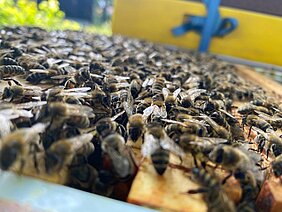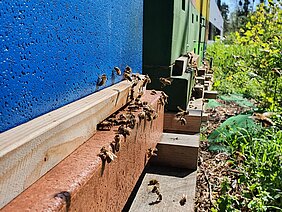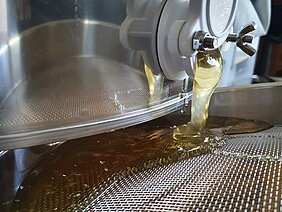One year after moving to the ATB premises in Potsdam-Bornim, the bees at ATB have successfully completed this year's honey season. The hard-working pollinators, which settled in February 2024, not only enrich the biodiversity on the premises, but also produced an impressive 250 kg of honey. In their first year, it was already 70 kg.
The variety of flowers on the institute grounds and in the surrounding area – from fruit trees in spring to meadow flowers and lime trees in summer – provided the bees with a rich source of nectar. The result: natural honey that is neither heated nor heavily filtered. A genuine ATB cuvée.
The wish of Saskia Strutzke and her beekeeping partner has come true: in spring 2025, more queens from Austria joined the founding colonies. This means that five commercial colonies and one offshoot are now at home at ATB. Even though last winter caused some unrest with a visit from a woodpecker and the arrival of the queens was not without ‘international tensions’, the colonies have developed magnificently. Perhaps too well? 2025 appears to be a particularly active year – ideal conditions for colonies with plans to relocate. Unfortunately, a swarm also left rtATB and, despite quick notification, could not be persuaded to return.
In future, the team of beekeepers will rely on a combination of traditional knowledge and modern technology. For example, there are plans to install a bee scale in autumn for live monitoring of weight fluctuations. A sensor-based monitoring system that is already in operation reports temperature, humidity and ‘mass starts’ (swarms) and is to be extended to all colonies. Operating methods are also being continuously developed, particularly with a view to ergonomic solutions and the expansion of natural comb construction – where bees build their combs independently and almost without aids – from the current level of around 50% to 100%. This not only promotes bee health, but also brings the bees closer to their natural way of life.
The importance of bees for the ecosystem and research is increasingly coming to the fore. The Potsdam city administration (Veterinary and Food Monitoring Department) has already expressed interest in honey analysis for Potsdam's statistics. And perhaps a hint of Africa or Asia will soon be buzzing through the grounds, as trials with alternative hive systems from other parts of the world are planned. We are excited about the combination of traditional knowledge and modern technology – after all, the world is a buzzing hub of diversity!



